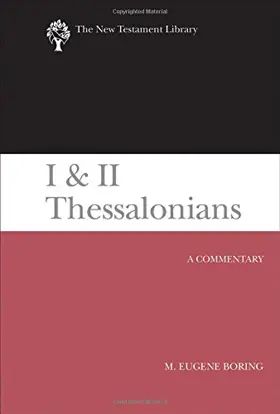

I and II Thessalonians
Publisher
Westminster John Knox
Published
8/24/2015
ISBN-13
9780664220990
I and II Thessalonians are letters written to the first, and then subsequent, generations of Christian communities in Thessalonica and the wider church. As our earliest Christian document, I Thessalonians is Paul's letter about how the Christian faith was interpreted in a new context twenty years after the beginning of the church. II Thessalonians, written by a teacher in the second generation of the Pauline school tradition, gives insights about how later generations interpreted the Pauline gospel, and is theologically instructive for our own efforts to do the same. In this new volume in the acclaimed New Testament Library series, M. Eugene Boring offers a scholarly interpretation of I and II Thessalonians while examining their historical context. Boring helps the reader learn to read these letters in context, particularly in relation to Paul's life as well as to the new converts who lived in Thessalonica. He addresses aspects such as structure, tone, style, language, and-for II Thessalonians-questions of authorship, while offering insightful theological perspectives. Boring's critical interpretation is a welcome addition to the New Testament Library and provides a solid resource for both the academy and the church.
Collections
This book appears in the following featured collections.
- New Testament Commentaries & Monographs by Princeton Theological Seminary
Reviews
Since the publication of FF Bruce's WBC volume, nothing, even Gordon Fee's NICNT, has surpassed Bruce's work, in my humble opinion. That said, Eugene Boring has come close with a more current commentary engaging with the work done since Bruce's volume. Boring is a more critical scholar, arguing against Pauline authorship of 2 Thess, though this does not hamper his interpretation. This commentary feature numerous excurses which provides greater detail of certain topics so the exposition doesn't get bogged down. The NTL format is user friendly, features the author's own translations, and features a diverse group of authors. Boring comes from a mainline protestant position, and so some interpretive conclusions may seem surprising to conservative evangelical readers. But overall, Boring has produced a helpful commentary for pastors, seminarians, and scholars to chew on, and is a significant contribution to Pauline studies, adding something outside the typical repeated conclusions of so many other Thessalonians commentaries.
